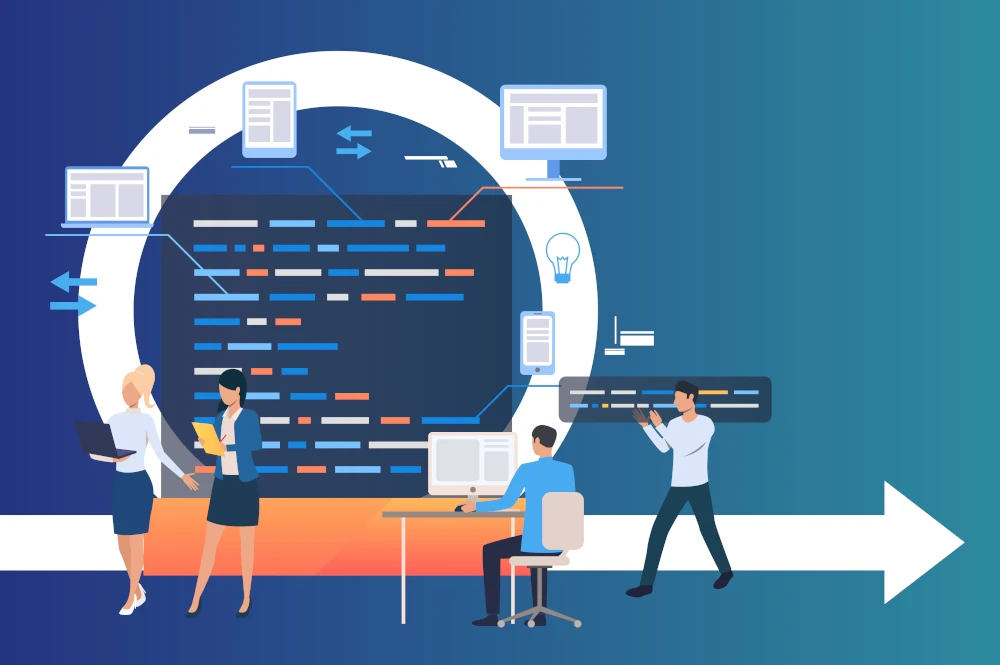Python is an essential component of software engineering since it provides simplicity and flexibility and has a rich environment that can help overcome development issues. It also makes tasks more efficient, applications more frequently developed with tight programming principles in mind, and better control over complex processes. Python developers are essential in enhancing the flow of work, speeding up the results, and reducing mistakes.

The success of Python is determined by professional coders who design programs for certain projects. They tighten Python’s impact on the enhancement of efficiency, collaboration, and reliability of the engineering processes. Syndicode.com is a Python development company that demonstrates how Python optimizes processes and produces outstanding outcomes.
Why Python is a Preferred Language in Software Engineering
Simple and Readable Code
Python is very easy to learn, understand, and write due to its simple syntax. People are then able to work on issues instead of grappling with syntax; hence, the productivity of teams is enhanced, and this will lead to minimizing mistakes. This also makes the work easy for non-programmers to comprehend, especially when working with other teams, if and when there is code sharing.
For instance, describing a function to a manager or designer is made easier by Python thus promoting better communication and coordination on the project. Furthermore, it maintains the use of indentation, thus ensuring the readability of the code, particularly when a squad of programmers is working on a single project.
Robust Libraries and Frameworks
Python’s huge toolbox of functions and applications does not require to be implemented from the ground up. For web development, there are Django and Flask; for data processing, there are NumPy and Pandas; in fact, almost every need of an engineer is met by Python.
Key library benefits:
- Celery is designed to work with asynchronous tasks.
- The two most powerful visualization libraries are Matplotlib and Seaborn.
- FastAPI makes it easier to develop and test backends.
When it comes to machine learning projects, TensorFlow and PyTorch have many pre-built modules, so developers can easily implement more complex algorithms. These tools bring faster development of the project while at the same time keeping quality standards high.
How Python Developers Streamline Engineering Processes

Automating Repetitive Tasks
When you hire Python developers, they help automate tasks efficiently, allowing teams to focus on higher-priority objectives. Scripts can even scrub data, produce reports, and monitor the system’s performance. For example, it is possible to write a script in Python that is capable of pulling, sorting, filtering and forwarding incoming emails or making API calls with the same level of efficiency and less possibility of making mistakes in the process.
Key examples:
- Data extraction, data analysis, and report writing.
- Arranging files according to certain principles.
- Reporting teams about the system problems in real-time.
It does not end with simple, repetitive tasks. There are also some additional libraries, for instance, Selenium for more complex web testing or Apache Airflow for a really heavy workflow for teams to handle large and repetitive tasks easily.
Building and Managing Scalable Systems
Python developers create applications that scale in demand. The high-traffic applications they build upon frameworks like Flask and cloud platforms like AWS Lambda.
Example: A web app that can be used by a limited number of users can support millions of requests within a short time. Python’s compatibility with tools such as Kubernetes means that businesses can be assured that they will be able to meet future demands without having to make significant changes to processes.
Also, libraries like asyncio for asynchronous programming control thousands of connections at once – it also makes Python preferred for creating real-time applications such as chatbots and online games.
Improving Collaboration Across Teams
Python’s choice and especially readability makes it rather easy to explain to other members in the organization who are not coding experts. That is why it can be used in various environments, including integration with languages such as JavaScript.
For instance, development in the back end can be done in Python since the majority of the frameworks are in this language but the front end can also be done in Python or even in JavaScript in the sense that it is all aimed at achieving the set project objectives. It also means that it is compatible with tools like Git to enhance version control to help developers work in a team and make projects more uniform.
Python’s Role in Collaborative Development
Bridging Communication Gaps
Technical discussions have become more accessible because of Python’s simplicity. It is possible to create Python scripts that managers and designers can comprehend without having to know much about programming. This closes communication gaps and makes projects more cooperative and effective.
This is in addition to Python’s integration with other languages, such as C++ to enhance cross-functional development where teams can work on related systems at once. The syntax is also consistent which makes it easier when sharing knowledge between the members of the team.
Supporting Version Control and Collaboration Tools
Python is well compatible with other tools like Git – a version control system to keep all the team members in parallel. It means that developers can quickly create a prototype using frameworks like Flask and get the first impressions, thus improving cooperation.
Python scripts also integrate with collaboration tools such as Slack and help in the management of workflows and communication between teams. It is common for these scripting languages to be used for reporting updating, and informing teams on system changes and metrics.
Challenges and Solutions for Python Developers
Common Challenges
The problems that Python developers encounter include slow memory usage in applications and dependency problems in large projects. This is an interpreted version and may cause the execution time to be slow even on high-speed systems.
Other difficulties are debugging of dynamic code, the problem of GIL in multi-threading and the security of third-party libraries.
Practical Solutions
As for code optimization with the use of libraries, such as NumPy, or profiling tools, such as cProfile, they tackle the performance problem. Tools like Poetry for Dependency Management can keep the application environment free of unwanted dependencies and their conflicts.
Additional strategies:
- MyPy helps to avoid type-related mistakes at the code-writing stage.
- It is important to note that multiprocessing eliminates the GIL constrains.
- Dependable guarantees the security of dependencies.
Embracing Python for Engineering Success
Python’s simplicity and versatility have been revolutionizing software engineering time and again. It enhances development processes and also cooperation and scalability. This paper establishes that Python developers are able to overcome these challenges and provide quality solutions if they employ the right strategies.
To those teams that are looking to enhance their workflows, implementing Python is not an upgrade; it’s a revolution. In this case, businesses are able to create, transform, and sustain themselves for the long run through its leveraging.


